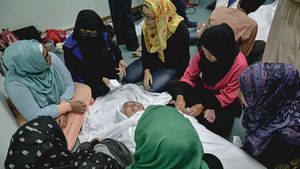JAKARTA - People with COVID-19 can experience a decline in cognitive function whose symptoms include forgetting to thinking slow or slow after they recover from COVID-19. Symptoms of cognitive decline are marked by the presence of "LALILULELO" which stands for unstable emotions or attitudes, absent-mindedness, forgetfulness, slow or sluggish thoughts, and decreased logic.
A neurologist at the University of Indonesia Hospital, dr. Pukovisa Prawirohardjo, Sp.S(K) said that the early symptoms of senile dementia or dementia, which is abbreviated as LALILULELO, need a doctor's examination. "If you find 1 of these 5 symptoms, immediately go to the doctor," he said in a press release at the RSUI, quoted from ANTARA, Tuesday, August 17.
A study presented at the Alzheimer's Association International Conference on July 29, 2021 in Denver, Colorado found that many COVID-19 survivors experience "brain fog" and other cognitive impairment within months of recovery.
In the study, researchers from the University of Texas Health Science Center at San Antonio Long School of Medicine and their colleagues studied cognition and the sense of smell in nearly 300 adults in Argentina who had COVID-19.
They studied the participants between three and six months after infection with COVID-19. As a result, more than half showed persistent forgetting problems. These findings add to a series of studies regarding long-term symptoms of COVID-19 such as confusion, forgetfulness and other worrying signs of memory loss.
Previously, a study published in the journal EClinicalMedicine The Lancet on July 22 showed that COVID-19 survivors, including those who no longer reported symptoms, showed significant cognitive deficits. This condition is experienced by both those who were previously hospitalized and those who were not.
Physical examination
Pukovisa recommends post-COVID-19 health checks for those who feel they have cognitive impairment after recovering from the disease caused by the SARS-CoV-2 virus.
This examination includes a thorough physical examination, especially blood pressure, respiratory system, body mass index, heart, blood vessels and digestion, screening for neurological complaints, cognitive screening, monitoring the risk of healthy brain and blood and radiology examinations if needed.
For those of you who want to screen for early detection of dementia, you can download the EMS (e-Memory Screening) application. This application was made by the Association of Neurologists throughout Indonesia.
"There are three main features in this application, including dementia articles, AD8-INA screening, and a list of hospitals and neurology specialists nearby," he said.
According to Puvokisa, people don't need to worry and worry too much. A health professional will help develop a program according to the cognitive problem at hand.
According to him, increasing social interaction and engaging in scheduled productive activities can help overcome the cognitive impairment experienced.
Nervous disorders due to corona virus
Based on several studies, corona virus infection not only attacks the respiratory tract, but can also have a negative impact on the nerves and brain.
A study in Mexico showed that of 370 patients treated, about 20 percent experienced neurological symptoms such as headaches, anosmia, ageusia and other neurological disorders.
In addition, research from Oxford showed that of the 236,379 patients diagnosed with COVID-19, 33.62 percent experienced neurological and psychiatric disorders in the 6 months afterward.
Specifically on nerves, the SARS-CoV-2 virus that causes COVID-19 can affect the area directly and indirectly, said a neurologist and Head of the RSUI Emergency Installation, dr. Ramdinal Aviesena Zairinal, Sp.S.
"Directly, the virus is in the nerve endings, for example the nerves in the nose, tongue, lungs, intestines, then to the brain. In an indirect way, nerves can be affected due to the body's response to viruses, viruses in the blood vessels. and circulates throughout the body and can enter the brain," he said.
In the initial conditions, neurological disorders can include headaches, smell and taste disorders. While in advanced conditions, neurological disorders can be in the form of stroke, decreased consciousness and seizures.
Therefore, according to Ramdinal, patients need to immediately see a doctor to prevent more severe complications.
He and his team have conducted research related to neurological disorders in patients with COVID-19 at RSUI and RSCM. They found, from 227 patients, there were several patients who experienced neurological disorders with symptoms including: decreased consciousness (59 cases), stroke (58 cases), fainting (46 cases), seizures (28 cases), headaches (22 cases). , brain infection (16 cases), and impaired smell or taste (8 cases).
Meanwhile, the mortality rate during hospitalization is 48.5 percent or 110 of 227 patients. This is because most of the patients treated have severe symptoms and also have severe neurological disorders.
Actually, it's not just COVID-19, which is a risk factor for cognitive impairment. Unhealthy lifestyles such as lack of exercise, eating an unbalanced diet, consuming alcohol and smoking can also be the cause of this problem.
In addition, there are other risk factors, namely having pre-existing medical problems, especially those related to the brain, diabetes, blood vessel disorders, high cholesterol, and high blood pressure.
The English, Chinese, Japanese, Arabic, and French versions are automatically generated by the AI. So there may still be inaccuracies in translating, please always see Indonesian as our main language. (system supported by DigitalSiber.id)













